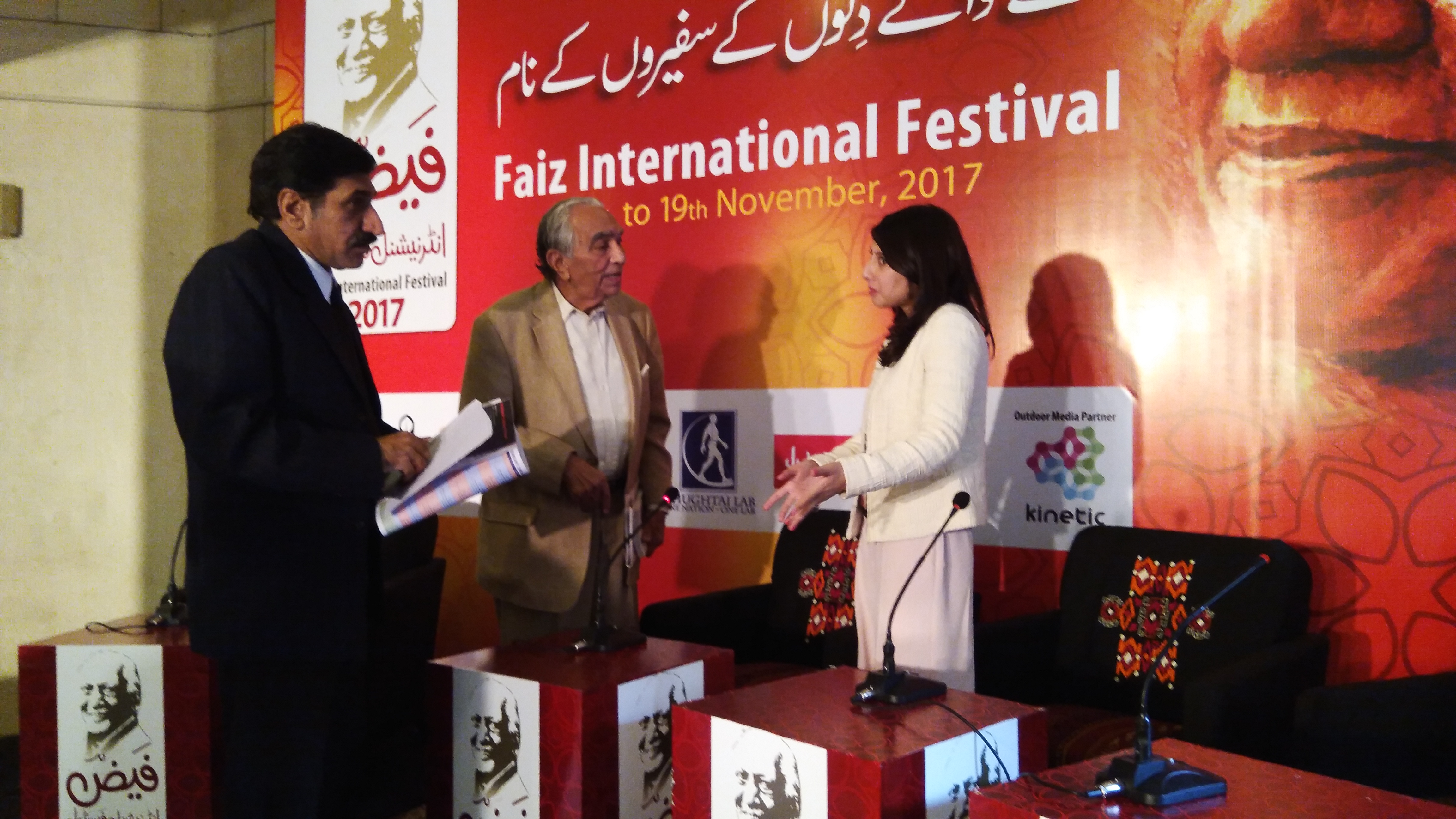FIF 2017: Pran Nevile's 'sentimental journey'

Pran Nevile: "To me Lahore is as special as what it was before 1947. It is not what has changed. Its soul is there, in its people." Photo: Abdullah Zafar
By Abdullah Zafar
Named after one of the most celebrated poets of Urdu language – Faiz Ahmad Faiz, whose poetry even after decades is considered a symbol of resistance, the Faiz International Festival kicked off in Lahore on Friday.
Organised by the Faiz Foundation Trust, the three-day festival being held at Lahore’s Alhamra Arts Council is an amalgamation of literature, music and arts. Featuring theatre performances, musical evenings, art exhibitions and activities for children, the festival also includes panel discussions by writers, artists and historians.
As part of the panel discussions being held at the event, the book launch of the renowned Indian author Pran Nevile’s ‘A Sentimental Journey’ was held on Saturday. The panel featuring the author himself also included Anum Zakaria, the author of ‘The Footprints of Partition: Narratives of Four Generations of Pakistanis and Indians’ and the well-known educationist and historian Dr. Tahir Kamran, Head of History Department Government College University Lahore.
Starting the conversation while sharing his experiences as a Lahori, Nevile talked about the identity of the city where he grew up. “Lahore is an internal city. A city that defines reputation… a city that defines description,” said the 95-year-old historian.
Nevile shared that he did not visit Lahore for years after Partition because he did not want his memories of the city to be overwritten with new ones. He wanted to write it all down and preserve the city that existed till 1947.
“All these years I had an inborn desire, a wish to write a book on Lahore.”
The historian further said that he was never interested in the politics of mass-division. He said that all he wanted to write down was about life, art, culture and everything that existed in Lahore during his days.
“I didn’t want my memories to fade away, the memories of a Lahore where Muslims and Hindus lived together.”

Pran Nevile and Anum Zakaria in conversation following the session. Photo: Abdullah Zafar
Discussing the changes that have occurred in the the hometown’s of those displaced on either sides of the border since 1947, the moderator moved to Anum Zakaria. When asked about how the once Lahoris felt about the city now, Zakaria said that when you talk about Lahore, people struck by nostalgia will always talk about the Mall Road and the Government College.
“But that’s not where it ends, memories from the partition have added to the nostalgia,” she said.
“I met and spoke to people who told about the massacre trains coming in, going to school after the summer vacations and not seeing any of those students. They talked about the city’s multicultural past,” added Zakaria.
She further shared that one person she interviewed had said, ‘Lahore changed forever that day.’
“While there are people who want to come to Lahore and visit their old houses, their neighbourhoods, meet friends and cherish the seven-decade-old bond, there are others who do not want to visit Lahore. They’re scared of what Lahore will look like now… they say this is not my Lahore.”
“The memory of Lahore goes beyond the city of Lahore today,” concluded Zakaria.
Talking about the old Lahore city, Dr. Tahir Kamran shared his views of the Hindu-Muslim dichotomy. He elaborated as to how even in the worst of times, it simply did not exist at some places, and how the number of Hindu students was more than that of Muslims in the Government College.
Sharing an anecdote with the gathering, Dr. Kamran talked about a conversation he had with Pran Nevile back in 2006.
“I remember once Pran sahib came to my office in 2006 and while in a conversation with me he said: ‘I topped in the matriculation exams, I topped in F.A., I topped in B.A.’ to which I replied in Punjabi saying ‘issi lieye tay assi Pakistan banaya si’ (that is why we made Pakistan).”
Conversing over his return to Lahore, Nevile said that he never criticises change.
“It is none of my business to talk about what has changed for the new generations. I’d rather talk to them and respect whatever they have to say because time changes everything,” said Nevile.
“To me Lahore is as special as it was before 1947. It is not what has changed. Its soul is there, in its people.”
.jpg)
Second day of the Faiz International Festival at Alhamra Arts Council Lahore. Photo: Aroosa Shaukat
Seconding Dr. Kamran, Nevile said that the Punjabis were loyal to the British till 1942 and Sir Sikandar Hayat had even told this to Jinnah. “It is recorded history,” he said.
“I never talk about politics. I never talk about the Partition because it is painful for both sides. It doesn’t serve any purpose. If I suffered, my counterparts in Pakistan suffered too. If I lost everything, they lost too,” said Nevile.
“It’s better to resolve your ties and cherish the common heritage and the common culture between both the countries. Arts and culture after all is the most valuable thing.”
Continuing to share his views on the common art and culture, and how the same heritage is shared by both the countries, Nevile said: “The singers in Pakistan sing the same ghazals as the ones in India. Our scriptures are the same because we think like each other.”
“Religion has nothing to do with culture and arts because culture is visual arts, performing arts and literature. Where does religion come in? I still don’t get it.”

